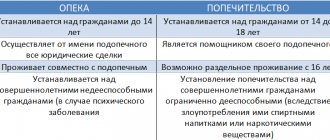Author of the article: Yulia Kaisina Last modified: January 2021 9660
In any country there are groups of citizens that are least protected in terms of legal and ordinary life activities. First of all, they include people with disabilities. Due to the characteristics of physical and/or mental development, such persons require care from other people. Registration of guardianship over a disabled person of group 2 allows us to solve this problem. Let's look at how it is implemented in the Russian Federation.
Guardianship of a group 2 disabled person in Russia: important nuances
Not everyone can officially take care of a person with disabilities. All the nuances of this process are clearly regulated by the state. It is more convenient to consider the main legal norms in the form of a table.
| Document's name | List of issues raised | The essence of the normative act |
| Federal Law No. 181 of November 24, 1995 “On the social protection of disabled people in the Russian Federation.” | The document gives an idea of the state’s social policy regarding persons with disabilities | Explanation of the procedure for registering disability, the concept of “social protection” and other issues related to this topic |
| Decree of the Government of the Russian Federation dated June 4, 2007 No. 343 | Coverage of issues of monetary payments to guardians | The emergence of the right to payments from the state and their amount |
| Federal Law “On Guardianship and Trusteeship” No. 48 | Regulating the relationship between the guardian and the ward | Features of the relationship between a guardian and a ward, their rights and obligations, tasks and responsibilities of supervisory authorities, the procedure for appointing guardians |
| Civil Code of the Russian Federation (Articles 32, 35) | General formulation of the terms “guardianship” and “guardianship” | Appointment of guardians |
| RF IC (Article 146) | Child custody | Requirements for candidates for guardianship |
A person who has lost his legal capacity as a result of illness and needs help in solving everyday and other issues has the right to receive it from a guardian. Group 2 disability is a reason for establishing guardianship.
Guardianship and foster care
Before initiating the procedure, it is important to understand what guardianship and patronage are. These terms refer to the same topic, but have significant differences between themselves:
- Full guardianship is established over a person who has undergone a judicial procedure to determine incapacity, for which his consent is not required;
- Patronage is the care and representation of the interests of a person with disabilities in all authorities at his request.
In both cases, it is customary to talk about guardianship.
Requirements for trustees
A person taking care of a disabled person must:
- Be his representative in all legal matters;
- Provide assistance with housework;
- Responsible for the health of the ward.
Not everyone can become a guardian for a disabled person. They are subject to strict requirements, and even if a person meets them, a person may be denied guardianship. First of all, preference is given to the immediate relatives of a person with disabilities.
It is easier for them to go through all the authorities and get a positive decision than for a person who is not related to a disabled person. For example, a mother will be the first candidate for the role of guardian of her child, who has suffered from a serious illness since childhood.
Prospective guardians should begin paperwork only after determining their compliance with the basic requirements. There are few of them:
- Age over 18 years;
- Full legal capacity;
- No criminal record (the law specifies a criminal record for actions directed against the life and health of people, but in reality a virtual absence of problems with the law is required);
- A sincere desire to take care of your ward.
If in the past a person has already formalized guardianship and voluntarily abandoned it or was deprived of this right by court, then the state will not allow him to take care of the disabled person again.
The financial and marital status of a person is important. The guardianship authorities are interested in:
How to confirm disability?
Sometimes it is first necessary to confirm the fact of disability. In this case, you need to pass a commission to approve this status. It contains 3 main stages: a medical examination, a medical opinion and an assessment by a commission of experts.
Experts evaluate:
- whether the disabled person is able to move and care for himself independently;
- can it work;
- whether he controls the adequacy of his communication.
In order to be confirmed as a Group 2 disability, a person must exhibit a moderate level of impairment in all of the above skills, for example, after a stroke or due to other diseases. But at the same time, this group is considered working, and full guardianship is often not mandatory. Sometimes a person has limited capabilities, but he is quite capable of working in special conditions and performing simple household chores. For example, a visually impaired person of group 2 is quite capable of being independent at home, as well as in a specially equipped workplace, but in the rest of the environment he needs the help of a guardian. It is a completely different matter if the commission makes a decision on the need for guardianship due to mental illness.
Instructions for preparing documents
The procedure for establishing guardianship consists of 3 stages:
- Collection of documents for the trustee;
- Preparation of papers for the ward;
- Contacting the guardianship and trusteeship authorities.
All papers must be submitted together with copies.
List of documents for the guardian
All the papers that the proposed trustee will have to collect are divided into 2 groups:
- Medical;
- Others.
The validity period of the first is from 1 to 6 months, the second is valid for up to a year. Based on this, the preparation of a package of documents begins with papers belonging to group 2. It includes:
- Passport;
- A document confirming monthly income (the certificate is drawn up for the past six months, and if necessary, it is replaced with an account statement, a certificate of a current individual entrepreneur or a pension certificate);
- Confirmation of the absence of problems with the law (citizens receive it at the nearest police station or MFC);
- Marriage certificate;
- Consent of all family members to register guardianship;
- Characteristics in any form from the place of work;
- Autobiography (there are no special rules for writing it).
An application must be filled out separately (a sample is provided below). All information is entered only by hand (employees of a government agency have the right to request additional information about the candidate).
The list of medical documents is limited to 3 items:
- Certificate of health (it is issued after passing a medical examination in a regular clinic);
- Certificate from a narcologist;
- Certificate from a psychiatrist.
They are received only in specialized institutions.
A package of papers for the ward
Who can apply for guardianship
The provision of a guardian is regulated by the following legislative acts:
- Federal Law No. 181;
- Article 32 of the Labor Code of the Russian Federation;
- Government Decision No. 281;
- Presidential Decree of May 12, 2008.
In addition, provision is stipulated by many internal circulars and orders within social services.
In order to obtain guardianship over a disabled person, the guardian himself must meet a number of requirements:
- the citizen must be an adult and fully capable;
- the person applying for guardianship must not have been previously deprived of this or a similar status;
- the guardian must have a stable, permanent income;
- the person applying for guardianship should not have socially dangerous diseases (AIDS, tuberculosis), as well as any drug addiction.
In practice, this means that a person who was previously deprived of guardianship or who abandoned his ward has practically no chance of renewing his status.
The chances are especially bad for those who have been deprived of custody or parental rights by a court decision. An unsuccessful reference from a place of work can also put an end to guardianship plans.
Important! Caring for elderly or sick relatives is not an obligation. Guardianship can be arranged exclusively on a voluntary basis.
The final decision on formal guardianship and provision of benefits is made by social protection authorities. The provision of cash payments depends on the financial status of the disabled person and the guardian.
Types of benefits
Payment of benefits for disabled people of the second group is carried out in the amount of 1200 to 5500 rubles. The amount is paid to the guardian directly on a monthly basis.
An important point to consider when receiving it is that this money is an aid to the person who has voluntarily taken guardianship; he has the right to spend it on any personal needs.
Important! The disabled person's benefit - pension, daily allowance, additional payments - must be spent exclusively on the needs of the pensioner. In case of inappropriate spending, the guardianship status may be removed.
Maximum assistance is provided to children's guardians, regardless of the severity of the disease. For guardians of elderly people over 80 years of age, payments will be 1,200 rubles. Persons caring for other categories of disabled people of group 2 are not entitled to payments.
The disability pension for the second group in 2021 will be about 5,200 rubles. EDV, together with monetization of benefits - about 2,600 rubles.
Registration of benefits
Application for the appointment of a monthly compensation payment to a person caring for a disabled citizen
Citizens who have formalized guardianship over a disabled person can receive assistance from the state. This can only be done through a court with an accompanying medical examination.
The procedure for receiving additional cash payments for guardians consists of four steps:
- Collection of documents for registration.
- Contacting the social security authorities with a statement.
- Waiting for the issue to be resolved (and appealing it, if necessary).
- Receiving funds.
Due to the relatively large amount of assistance for the guardian of a disabled child (payments are higher than the pension of the disabled person himself), a number of difficulties may arise during registration.
For example, a pensioner will need to confirm his financial problems with several certificates, and the guardian must live with the disabled person in the same living space.
Required documents
Social security authorities require the mandatory provision of the following documents:
- ID card (copy and original);
- application for assistance;
- a copy of the disabled person's ID indicating the group;
- decision of the guardianship authorities to grant rights;
- cover page of the savings book with the account number for transferring benefits;
- a certificate confirming the joint residence of the guardian with the pensioner.
The last document is issued at the passport office of the Ministry of Internal Affairs office located at the place of registration of the disabled person. The application is filled out on the spot, with a social service employee or MFC.
Important! If the registration is carried out by a third party by proxy, he also needs to provide his identification document (original and copy).
In addition to this mandatory set, government agencies may request any other documents: from a certificate of absence from work to a bank statement showing the status of accounts.
Contacting the guardianship authorities
Type of application
| Appointment of guardianship over a minor |
| Guardianship of an elderly person |
| Guardianship of an incapacitated person |
| Statement of claim regarding the incapacity of a certain person |
You can apply for benefits by submitting an application to the population protection department at your place of registration or to any nearest MFC.
The application can be submitted either by the guardian himself or by his authorized representative. The power of attorney must be notarized.
The documents are the same in both cases, only the mechanics of the work change. When contacting the MFC, issues of internal interactions are taken over by the center.
This will take a little longer, but the notification will arrive almost immediately to the communication channel you specified in the application. The “single window” concept allows you to solve all problems with receiving payments in one place.
Working with social services directly will be a little faster - the extra intermediary of the MFC is excluded from the scheme, and interaction with the employee directly motivates him to complete the work faster. The downsides are queues and one or two lost days.
Waiting times
The maximum statutory review period is a calendar month or 30 days. On average, it will take much less time to reach a verdict - from one to two weeks.
When registering through the MFC, a notification of the decision will be sent in the way you specified: via e-mail or sms.
For those registered with the social service, notification is sent in writing. In order not to miss the application, it is recommended to visit in person or call the social security authorities at least once a week after two weeks.
Types of benefits
Guardians of disabled people of the second group are entitled to a number of benefits related to their main job:
- shortened working hours;
- four paid days off every month;
- refusal of business trips, overtime on weekends and holidays, overtime shifts (optional);
- additional 14 days of unpaid leave annually;
- retirement 5 years earlier.
Important! If a disabled person requires constant supervision and care, the guardian has the right not to work and at the same time receive work experience.
Registration of guardianship over a disabled person of group 2 due to mental illness
If the potential ward has received a group for mental illness, then the procedure for establishing guardianship will go through the court. The hearing will focus on full custody.
Therefore, it is important to consider several nuances:
- The appointment of a trustee occurs without taking into account the wishes of the disabled person;
- The opinion of a person with disabilities regarding the candidacy of a guardian is not taken into account by the judge;
- The application is submitted not to the guardianship authorities, but to the court (the fee is 300 rubles, which are compensated by the state if the claim is satisfied);
- A package of documents (identical to those described above) is attached to the application;
- The reason for establishing guardianship will be the recognition of the patient as incompetent;
- After the decision on incapacity, the judge approves the candidacy of the guardian.
Trials take place in the mandatory presence of:
- The sickest person;
- Prosecutor's office employee;
- Guardianship officials.
The court provides several stages, which include:
- Familiarization with the case;
- Appointment of a medical examination (if there is strong evidence in the form of medical papers and extracts, additional examinations are not carried out);
- Making a decision.
From the moment the patient is declared incompetent, he loses the rights to:
- Introduce yourself;
- Dispose of property;
- Conduct legal transactions and so on.
It is possible to conduct proceedings without a disabled person, but only if the severity of his illness is confirmed, which does not allow him to be in the courtroom.
If during the hearing it is proven that the patient should be treated in a special institution, then all functions of the guardian are transferred to this institution.
Grounds for termination
Guardianship is not a lifelong status. Article 29 of the Federal Law of the Russian Federation No. 48 establishes certain conditions under which it is terminated:
- Due to the death of a ward.
- If the validity period of the order appointing a guardian has expired.
- When removed from duties by guardianship authorities.
The law establishes that the competent authority may terminate the regulation by its decision for the following reasons:
- The guardian expressed a personal desire for termination.
- The interests of the guardian and his ward turned out to be conflicting.
- If it is proven that the guardian performed the duties assigned to him in bad faith.
- Provided that the audit reveals facts of failure to take measures to preserve the property of a disabled person by the guardian.
If the released person does not agree with the decision of the guardianship authority, he has the right to challenge it through the court by filing a statement of claim.
Refusal to approve a candidacy
An unequivocal refusal will be given to persons who:
- Have been convicted;
- Provided knowingly false information;
- Deprived of parental rights;
- Do not meet the requirements provided by law.
If the alleged guardian is not satisfied with the refusal received, he has the right to appeal it within 10 days from the date of the decision. In such a situation, an appeal is written and sent to the appeal department of the regional court.
Only the person who has received a refusal can write the paper.
How to properly arrange guardianship?
Be prepared for the fact that you will have to interact quite closely and for a long time with medical institutions, social protection authorities, and sometimes even the courts. The whole process is determined by Decree of the Government of the Russian Federation No. 423 and consists of several main stages:
- official confirmation of the fact of disability;
- certificates stating that the applicant’s health complies with the obligations and tasks of the guardian;
- collection of regulatory documentation package;
- drawing up an application to submit to social security authorities;
- in some cases - going to court and preparing relevant documents;
- waiting for a decision from the judiciary;
- waiting for the conclusion of the social security authorities and establishing the rights of the guardian;
- assignment of benefits and allowances.
It is worth going to court only if the ward’s incompetence is proven. In other cases, the associated stages can be avoided.
Termination of guardianship over a disabled person of group 2
There are 6 situations that may result in the termination of guardianship:
- Voluntary refusal of the guardian;
- Refusal of the ward;
- Recognition of the patient as legally competent (this applies to persons with mental disorders);
- Suspension as a result of an investigation and determination of inadequate care;
- Leaving a patient in a dangerous situation;
- Death of one of the parties.
In any of the above cases, the official representative submits a financial report to the guardianship authorities for the entire period of his activities. If improper care is detected, the responsible person is subject to criminal and administrative liability.
Registration of guardianship over a disabled person of group 2 is a long and complex process. It takes place in several stages, which allows us to identify those who are able to care for the patient with love and patience.
Subjects of legal relations
Guardianship of a group 2 disabled person can be granted only after the citizen has been assigned such status. In accordance with Order of the Ministry of Social Development No. 1013\2009, the following limitations of abilities must be established for the person under guardianship:
- labor activity - the need to create special conditions for its implementation;
- self-service – a person requires outside help in solving a number of everyday issues;
- communication – a disabled person cannot fully contact other people, perceive and transmit information without outside participation;
- behavior control - requires the participation of third parties when in society;
- acquiring knowledge – the difficulty of perceiving and remembering the necessary skills and knowledge;
- orientation – a person cannot fully orientate himself in space and does not adequately perceive the surrounding reality.
The status of a guardian can be assigned not to anyone who wishes, but to a circle of persons who, without selfish motives, are able to fulfill the assigned obligations, including taking into account that the disability is due to mental illness. These are always capable persons who have reached the age of majority.
The candidacy of a guardian is considered from the standpoint of personal and moral qualities. Factors such as living conditions, health status, characteristics of relationships with other relatives, and the presence of a permanent job or other stable source of income must be taken into account.
A categorical taboo applies if the following facts are established:
- lack of permanent, stable income;
- having a criminal record for illegal actions encroaching on the life or health of others;
- non-compliance of the available living space with sanitary requirements and standards;
- alcohol or drug addiction, the presence of diseases that complicate or prevent full care.
Preference is given to close relatives, for example, guardianship of an elderly disabled person of group 2 is often formalized by children. But if there are none, or do not show a desire to take on obligations, a person from outside the family circle may be appointed as a guardian if all basic selection criteria are met.











